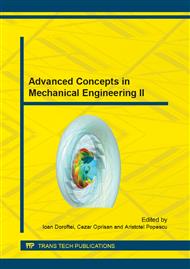p.163
p.171
p.177
p.183
p.189
p.195
p.201
p.205
p.211
Virtual High Speed Diesel Engine – A Simulated Experiment, Part I: Combustion Dynamics
Abstract:
The research efforts in the direction of internal combustion engines functional cycle simulation, particularly for small capacity diesel engines, are justified by shortening the path between the new conceptual solution and its effects and also to reduce research costs. There can be adopted new organizational and management solutions for the combustion process after these, for example, confirm at the model level. This paper proposes an unizonal physico-mathematical combustion model in high speed small Diesel engines, based on a Vibe-type law and on the heat transfer through the combustion chamber walls modelated after Woschni. The complexity of the model justifies the name of „virtual engine”. This allows to determine the functional parameters as instantaneous and average values, at any engine operating regime. The simulated experiment takes place in perfectly controlled conditions and leads to good results. There are obtained, during the combustion process, dynamics of parameters concerning the vaporization characteristics, combustion characteristics and combustion kinetics, for any operating regime. The parameters are evolving in a predictable way, being experimentally confirmed.
Info:
Periodical:
Pages:
189-194
DOI:
Citation:
Online since:
October 2014
Authors:
Keywords:
Price:
Сopyright:
© 2014 Trans Tech Publications Ltd. All Rights Reserved
Share:
Citation:


